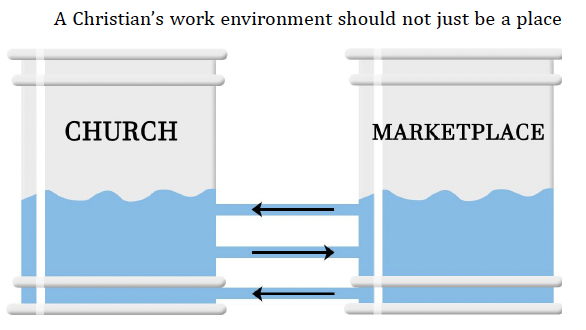Whole Life Stewardship
Christians have an instinctive response to the word “stewardship.” They may reach toward their back pockets because they know that someone is going to ask for money. After all, that’s the primary context in which they’ve heard the word. Or perhaps they have heard stewardship used more broadly. Their church may talk about the stewardship of time, talents, and financial resources. In addition to the appeal to one’s pocketbook, this is also an appeal to their calendar, challenging them to get more involved by volunteering in one of the church’s ministries.
I am not diminishing the importance of stewardship within a community of faith, but I want to suggest a more comprehensive and accurate application of the concept. If I see myself as a “steward,” I am acknowledging that I own nothing. Everything that I have – my finances, my talents, my time – belongs to God. And for many, time is the most precious of those resources.
Being a good steward of time means using those hours in ways that honor God and conform to His will. And where is the single place that consumes the greatest number of our waking hours? Work, of course. It is only appropriate, then, to consider what good stewardship looks like in the marketplace. A few people might contend that faith should have no bearing on what they do at work. This highly compartmentalized argument says that “faith” is for Sundays. Then on Monday through Friday, one’s behavior is dictated by the norms of the work environment.
Dedicated Christians reject this argument. They acknowledge that their faith is not something to be turned on when it’s time to go to church and then turned off during the week. They look to Scripture, not the company policy, for the ethical framework that drives their behavior. In many cases, however, this is just a diff erent form of compartmentalization. As shown in the accompanying graphic, the individual’s primary expression of faith is still found in his or her church. A modest amount of their faith “drips” into the workplace.
In this framework, one’s church is where faith is formed and the primary place where it is practiced. It is a higher and nobler place. The Christian then decides how much to open the “faith spigot” on the job. The most typical expressions, ranging from slightly to wide open, are
- Adhering to high ethical standards,
- Identifying publicly as a Christian,
- Participating in workplace Bible studies, and
- Evangelizing co-workers.
All of these activities are meaningful ways for a person to demonstrate faith in the marketplace, but they fall short of whole-life stewardship. In essence, this person is saying, “I’m an employee of Company X, and I happen to be a Christian.” Whole-life stewardship says, “I’m a Christian, and one of the places where God has called me to minister is in Company X.” This perspective does not see work as “lower” or faith as a valve that can be opened or closed.
that is just touched by faith. If believers are living God-honoring lives, then their faith should be integrated into everything they do. There should be no difference in who they are at church, at home, and at work. Three broad ideas shape an understanding of “whole life stewardship”:
- Laying the right foundation
- Changing one’s mindset
- Making the most of opportunities
Laying the Right Foundation
A friend once explained the reason that she didn’t have a bumper sticker with a Christian message is that she didn’t want her driving to turn anyone away from God. Many Christ-followers have similar thoughts about faith in the marketplace. They have had an experience with someone whose faith was very public but whose actions did not point toward Christ. Integrating faith into our work requires laying the right foundation. That foundation has three elements:
- Understanding and applying Scripture,
- Demonstrating excellence, and
- Caring for others.
The right foundation starts with the Bible. Too many people have a passing knowledge of biblical teaching but have never thought about the marketplace implications. Being a good steward at work means knowing what is taught in Scripture and wrestling with how it applies on the job. The latter is particularly important. As a starting point, consider whether those who profess faith keep the Ten Commandments. Do they occasionally “shade the truth” in order to look better (“do not lie”)? Or become jealous of a coworker’s promotion or raise or bigger office (“do not covet”)? Even the sixth commandment – “do not murder” – is not safe ground in light of Jesus’ explanation that this commandment applies to “anyone who is angry with his brother” (Matthew 5:22).
Ephesians 5:3 is another simple verse with broad marketplace implications: “But among you there must not be even a hint of sexual immorality, or any kind of impurity, or of greed, because these are improper for God’s holy people.” Christians know that adultery is wrong, but they may lower their standards in ways that give a “hint” of impurity or greed. Or they may overlook the fact that the “acts of the sinful nature” (Galatians 5:19) include “fits of rage” and “selfish ambition.” The bottom line is that whole-life stewardship is a call for believers to continually wrestle with how the Bible applies to their work.
Laying the right foundation also requires excellence in how Christians perform on the job. Colossians 3:23 instructs, “Whatever you do, work at it with all your heart as working for the Lord and not for men.” What does that mean in today’s workplace? It means the same now as it did two thousand years ago. Regardless of whether someone has a great boss or a terrible one, they are supposed to work equally diligently for either because they’re actually working for God. Disagreeing with the company’s new strategy is not a valid excuse to slack off .
Co-workers should never hear faith as an excuse for mediocre performance, such as “I missed that deadline because I was up late last night volunteering with our youth group” or “My reward is in heaven, so I didn’t knock myself out just to get the bonus on this project. Instead, a Christian’s commitment to consistent, high-quality works should cause others to take note, not for bonuses or promotion, but because it lays the foundation for greater influence. The final element of the foundation is how believers interact with and treat co-workers (peers, staff that work for us, and bosses). The Bible is full of “one another” instructions. While some of these are specific to relationships between believers, many of them give guidance for the treatment of all people.
WHOLE-LIFE STEWARDSHIP IS A CALL FOR BELIEVERS TO CONTIN- BUALLY WRESTLE WITH HOW THE IBLE APPLIES TO THEIR WORK.
Followers of Christ are instructed, “In humility consider others better than yourselves” (Philippians 2:3) and “clothe yourselves with compassion, kindness, humility, gentleness, and patience” (Colossians 3:12). In practical terms, the believer who is serious about whole-life stewardship shows interest in the personal well-being of colleagues, refuses to engage in cutthroat behavior, gives full credit where due, and genuinely celebrates the success of others. Anyone that practices this high standard at work will stand out.
A New Mindset
The foundational practices will move any Christian well down the road toward a more robust understanding and practice of whole-life stewardship. But if that’s all that they do, it’s the equivalent of operating in the old paradigm with the valve wide open. It is better than just letting a little faith drip into the workplace, but it’s far short of living into the new paradigm. The only way to make that shift is to adopt a completely new mindset. This mindset is based on the understanding that every believer is a minister, part of a “royal priesthood” (1 Peter 2:9) and “Christ’s ambassadors” (2 Corinthians 5:20). These verses are not just those in vocational ministry or “super- Christians.” They are for all Christ-followers. Christians may agree that this call applies to them, but the old mindset may cause them to limit their ambassadorial role to the church. The church may even promote this thinking in subtle ways with a sermon series that focuses on serving or a ministry fair where members can sign-up for a variety of internal opportunities.
These efforts are not inappropriate, but they are incomplete. Think of it this way. If everyone made a deep commitment to serve in a church’s ministries, how would the sudden flood of volunteers be used? And who are most of these ministries for? In most churches, the proportion of ministry that is outward-facing (evangelism and missions) is quite small. If these are the only places to be a “royal priesthood,” then many of the places of influence where Christians spend time are out-of-bounds. In the mindset of whole-life stewardship, all are ministers and are called to “do ministry” wherever they are. If “wherever” is in a cubicle along with a team of programmers or engineers, that is a place of ministry. If it’s on the creative team of an ad agency, one is a minister there. Those who hold senior leadership positions in a company have powerful platforms for ministry. This mindset is not about opening the faucet so that a little more faith drips into the office. Someone who is practicing whole-life stewardship integrates faith into all that they do. They are a missionary to the marketplace The familiar words of the Great Commission are, “Go and make disciples.” Too often that is heard as a call for the super- holy to consider a career in foreign missions. But the most accurate translation is, “As you are going, make disciples …” It applies to all believers, because all going somewhere – to children’s events, to a restaurant, and to work. As they are going to all these places, Christ-followers have an opportunity to do their part for the Great Commission. This highlights one more wrinkle in the traditional way of thinking. Many Christians have been taught to believe that vocational ministry is a “higher calling” than any secular job. But this mindset says that vocational ministry is simply a different calling, not a better or nobler one. As long as believers are seeking to obey God’s call for their lives and using their gifts to honor and glorify Him, they’re as faithful as any clergyperson.
Making the Most of Opportunities
A foundational verse for those who practice wholelife stewardship is Colossians 4:5 – “Be wise in the way you act toward outsiders; make the most of every opportunity.” Once the foundation is laid and the new mindset is adopted, Christ-followers will discover that there is no shortage of opportunities for ministry wherever they work. The question is what they will do with those opportunities.
I still have a vivid memory of a missed opportunity earlier in my career. I was running a small environmental service company, and one of our managers had come into town for a routine meeting. After our business was finished, he told me that he and his wife had separated and were about to get a divorce. I still remember his words: “There’s just not any romance in our relationship any more.” I made a feeble attempt to encourage him to consider other options and to think about the impact this decision would have on their 17-year-old daughter. But to this day, I regret that I wasn’t bolder and more compassionate in my reaction to his confession and his need. Caring for colleagues (part of the foundation) inevitably creates deeper opportunities for ministry. In many work environments, the demands of the job and the press for profits makes simple acts of compassion seem exceptional. Offering assistance to a co-worker – not because it is demanded by the current project or for personal gain – sends a powerful message. It may meet a hunger or thirst that is different, but just as real, as the ones described by Jesus in Matthew 25. Opportunities are also created when one is willing to share authentically about personal struggles. Part of the standard workplace “wardrobe” is a confident façade that all is well, on and off the job. The implicit assumption is that any sign of weakness will be exploited to the person’s detriment. The believer that is willing to talk about feeling inadequate – whether as a spouse or a parent or an employee –stands out as different and more approachable.
Christians that do these things and prayerfully make themselves available may be surprised at the opportunities that God gives them:
- One senior executive arrived at work on a Monday and learned that the spouse of one of his direct reports had died in an accident over the weekend. He was able to be a pastoral presence to the grieving employee and help others in the company respond compassionately to this tragedy.
- With an MBA from a top-ranked school and a fast-track start to an executive role, one woman transitioned to a less prominent and less lucrative career track. She had a number of opportunities inside and outside of the company to tell others how her faith and prayer guided that decision.
- After years of answering with the obligatory, “My kids are doing great,” one manager decided to be honest about his son’s addiction problems and how his faith sustained him in this dark season. After that, he walked with several colleagues through their own parenting struggles.
What about evangelism? Shouldn’t Christians in the workplace share their faith with all of their colleagues? Peter’s instruction is to “always be prepared to give an answer to everyone who asks you to give the reason for the hope that you have. But do this with gentleness and respect” (1 Peter 3:15). Sharing one’s faith should be a natural outflow from these kinds of opportunities, not a forced or arbitrary conversation. Anyone, at any level of an organization, can seize opportunities that are created by whole-life stewardship. For those in executive roles, the opportunities can be more visible and can have a broader impact. Of course, executives have a-fiduciary responsibility to shareholders, but they also have a spiritual responsibility to God. Living in this tension, a Christ-following executive may nix an advertising campaign that is morally questionable or push for higher wages for his lowest paid employees or allow her faith story to be made public.
One executive was responsible for selecting the location of a new call center in a developing country and then opening this operation. There were a variety places that met the company’s financial criteria, so this businessperson was able to choose a location that coincided with one of his church’s partnership ministries. Many of the new employees for the call center were part of the church that had been planted in this community. In seizing this opportunity, the executive fulfilled his job responsibilities and joined in God’s Kingdom-building work.
During the monumental effort to rebuild the wall around Jerusalem, Nehemiah’s opposition tried to pull him away for a negotiation. He responded, “I am carrying on a great project and cannot go down” (Nehemiah 5:3). For Christ-followers, the opportunities for ministry in the marketplace that come from practicing whole-life stewardship can become that great, God-ordained project.
About the Author
Mike Bonem is an author, consultant, speaker, church leader, business person, husband and father. He loves to help ministries and their leaders grow in eff ectiveness to reach their God-given potential (www. mikebonem.com). Mike’s books include In Pursuit of Great and Godly Leadership and Leading from the Second Chair. He has spoken across the country and internationally on topics related to ministry leadership and congregational effectiveness. Mike has an MBA from Harvard Business School and a breadth of experience in ministry and business, including 11 years as an executive pastor, consulting with Fortune 100 companies, and leading a start-up business.











